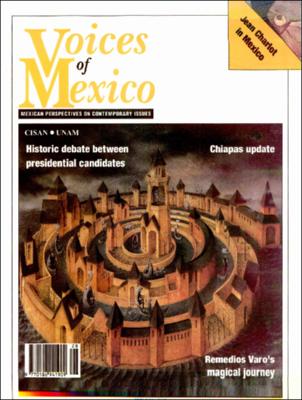Mostrar el registro sencillo del ítem
Voices of Mexico: Mexican Perspectives on Contemporary Issues
| dc.rights.license | http://ru.micisan.unam.mx/page/terminos | |
| dc.contributor.editor | Toro Gayol, Marybel | |
| dc.contributor.other | Velasco Montante, Astrid | |
| dc.date.accessioned | 2018-12-04T00:35:47Z | |
| dc.date.accessioned | 2022-02-17T00:15:48Z | |
| dc.date.available | 2018-12-04T00:35:47Z | |
| dc.date.available | 2022-02-17T00:15:48Z | |
| dc.date.issued | 1994 | |
| dc.identifier.issn | 0186-9418 | |
| dc.identifier.uri | https://ru.micisan.unam.mx/handle/123456789/16735 | |
| dc.format | application/pdf | |
| dc.format.extent | 104 pp. | |
| dc.language.iso | eng | |
| dc.publisher | Universidad Nacional Autónoma de México, Coordinación de Humanidades, Centro de Investigaciones sobre América del Norte | |
| dc.relation.isformatof | ||
| dc.relation.haspart | Our Voice / Margáin, Hugo B.; The Mexican Economy in 1993 / Toro Gayol, Marybel; Comments on the Banco de México"s Annual Report (1993) / Ortega, Miguel A.; Remedios Varo, A Magical Journey / Isaak, Dinorah; Feliciano Béjar: The Poetry of All Things / Rábago Palafox, Gabriela; The San Carlos Museum / García Barragán, Elisa; From Mulroney to Chrétien: More of the Same? / Legler, Thomas; Canada"s View of Mexico / Hossie, Linda; Octavio Paz: Eight Decades of Poetry, Politics and History / Ching, Mónica; Margaret Atwood and Octavio Paz: Convergence and Divergence / Martínez-Zalce, Graciela; The Historical Novel in Mexico / Aguirre, Eugenio; Mexico in the Art of Jean Charlot / Villa, Yohualli de la; Orozco in San Ildefonso: The Eruption of Modernity on the Walls of the Past / Bahena P., Miguel Ángel; The "Madness"of Marcos / Chamizo Guerrero, Fernando; Beyond the Truce / Montiel Ziegler, Elsie; The Maya World in Movement / Eccardi, Fluvio; Carrillo T., César; The Rainforest Farmers / Natios, James D.; The Central Post Office / Velasco Ballesteros, Maricarmen; Intelligent Buildings in Mexico / Rivero, Fernando del; The U.S. and Cuba: Changes Ahead? / Pérez Benítez, Santiago; Historic Debate in Mexico / Toro Gayol, Marybel | |
| dc.relation.requires | Adobe Acrobat | |
| dc.subject | HUMANIDADES Y CIENCIAS DE LA CONDUCTA | |
| dc.title | Voices of Mexico: Mexican Perspectives on Contemporary Issues | |
| dc.audience | Estudiantes | |
| dc.audience | Maestros | |
| dc.audience | Investigadores | |
| dc.audience | Otros públicos | |
| dc.audience | Medios de comunicación | |
| dc.contributor.assistanteditor | Montiel Ziegler, Elsie | |
| dc.contributor.assistanteditor | Ching, Mónica | |
| dc.contributor.businessmanager | Ocampo, Consuelo | |
| dc.contributor.corrector | John, Steven S. | |
| dc.contributor.designer | Noriega, Ricardo | |
| dc.contributor.designer | Belmar, Marco Antonio | |
| dc.contributor.editorinchief | Margáin, Hugo B. | |
| dc.contributor.layout | Glypho, Taller de Gráfica | |
| dc.contributor.printer | Offset Setenta | |
| dc.contributor.salesandcirculationmanager | Del Rivero, Fernando | |
| dc.contributor.translator | Stephens, Suzanne | |
| dc.contributor.translator | John, Steven S. | |
| dc.contributor.translator | Valero, L. F. | |
| dc.contributor.translator | Jinks, Pauline | |
| dc.coverage.placeofpublication | México | |
| dc.date.printcopyrighted | 1994 | |
| dc.description.extract | After decades of effort. Extermination of one’s enemy is impossible. Key among the demands is reform of electoral laws —those in force caused conflicts in the 1988 national elections as well as in state elections in San Luis Potosí, Guanajuato, Michoacán and Yucatán; the abolition of the Chiapas penal code, which allowed landowners and local government authorities to grind down the poor peasants; reforms to Article 27 of the constitution, the application of which has led to poor peasants being dispossessed of their community (ejido) lands; bilingual education, so Indians may speak Spanish as well as their mother tongues; and respect for Indians" age-old, special democratic forms of government, without breaking the pact achieved on the federal level. At the end of the talks the different ethnic groups’ representatives returned home to consult their communities and obtain their approval of the points discussed with the Mexican government. In one of his many communiqués, subcomandante (EZLN Deputy Commander) Marcos stated: "We ask everything for all, nothing for ourselves." The striking concentration of wealth among groups which have benefited from the economics of privatization, contrasting with the extreme poverty in which many Mexicans live, makes it necessary to correct current policies. What our country needs are better forms of redistributing wealth, fundamentally jobs and education, so we may all enjoy a decent life. At the end of last year a political analyst sent us a series of reflections on the situation of the country, raising the question whether Mexico should continue along the political and economic path taken. The particular merit of Miguel A. Ortega’s article is that, anticipating events, it pointed out problems that make up the background to the Chiapas revolt. Voices of Mexico will be following the development of these important events; yet even now one can state that New Year"s 1994 changed the country. Attention is now focused on how to achieve progress that will benefit everyone. "There is no progress without social justice, just as there can be no social justice without progress” —this axiom is gaining new force again today. In the electoral field, José Francisco Ruiz Massieu has contributed an in-depth analysis of the Chilean case. He leads us to think about the sort of "padlocks" a regime can impose to limit the transition to democracy, as Pinochet did when he realized the international community was intent on isolating him and he sought to hold on to power through the most various sorts of legal reforms. Five months before the presidential elections, Mexico has experienced a serious blow against democracy. Luis Donaldo Colosio, presidential candidate of the Institutional Revolutionary Party (PRI), was assassinated. This unexpected and brutal tragedy has transformed the country’s political landscape. More than even we need serenity from political parties and the public in general, in order to achieve peaceful elections. We hope light will be shed on this useless crime, and that in these difficult moments we will achieve national unity to continue on our path of progress through dialogue, negotiation, peace and stability. And that the enemies of democracy will be overcome by the power of civil society | |
| dc.discipline.clase | Multidisciplina | |
| dc.educationlevel | Medio superior | |
| dc.educationlevel | Superior | |
| dc.educationlevel | Posgrado | |
| dc.identifier.cisan | VOM_1994_0028 | |
| dc.identifier.conacyt | CONACYT | |
| dc.relation.issued | 28, July-September, 1994 | |
| dc.rights.accesslevel | openAccess | |
| dc.rights.creativecommons | http://creativecommons.org/licenses/by-nc-nd/4.0 | |
| dc.subject.conacyt | 4 | |
| dc.type.spa | other | |
| dc.view.accesslevel | DISPONIBLE |
Ficheros en el ítem
Este ítem aparece en la(s) siguiente(s) colección(ones)
-
Números completos [125]
MiCISAN, Repositorio Institucional
Hecho en México, todos los derechos reservados 2018. Esta página puede ser reproducida con fines no lucrativos, siempre y cuando no se mutile, se cite la fuente completa y su dirección electrónica. De otra forma, requiere permiso previo por escrito de la institución.
Sitio Web administrado por: Centro de Investigaciones sobre América del Norte • micisan@unam.mx








